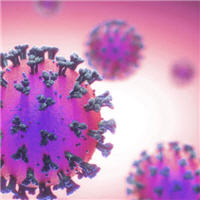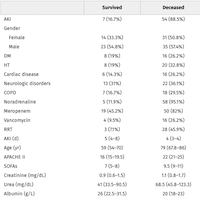Tag: AKI

Fluid Personalization and Vasopressor Decisions in Early Sepsis Management
In this randomized vignette survey study of US critical care clinicians, we found that fluid volume already received was associated with the largest changes in decisions to administer additional fluids or initiate vasopressors... read more

AKI Risk Factors in ICU Patients Using Colistin
Colistin, an antibiotic of polymyxin group, has recently been increasingly used in the treatment of multidrug resistant gram-negative bacteria. However, it has serious adverse effects such as acute kidney injury (AKI). We... read more

Ilofotase Alfa Doesn’t Improved Survival Among Critically Ill Patients with SA-AKI
Sepsis-associated acute kidney injury (SA-AKI) in patients admitted to an intensive care unit is associated with significant morbidity and mortality. There is currently no pharmaceutical treatment. Although we found no... read more

A Global Perspective on AKI After Major Surgery
Acute kidney injury (AKI) is an abrupt decline in kidney function occurring within hours or days. In patients having surgery, postoperative AKI is a major complication associated with adverse outcomes including mortality.... read more

Initiation of CRRT vs. Intermittent Hemodialysis in Critically Ill Patients with Severe AKI
In critically ill patients with severe acute kidney injury (AKI), initiation of continuous renal replacement therapy (CRRT), as compared to intermittent hemodialysis (IHD), was associated with a significant reduction in the... read more

Optimal RRT for Critically Ill Patients with Severe AKI
In critically ill patients with severe acute kidney injury (AKI), initiation of continuous renal replacement therapy (CRRT), as compared to intermittent hemodialysis (IHD), was associated with a significant reduction in the... read more

Urine Output-based Sepsis-associated AKI: Clinical Implications
This paper offers comprehensive insights into the epidemiology of acute kidney injury (AKI), and we commend the authors for their significant contribution. They revealed an increase in the number of mild cases among AKI stage... read more

Epidemiology of Surgery Associated Acute Kidney Injury (EPIS-AKI)
In a comprehensive multinational study, approximately one in five patients develop PO-AKI after major surgery. Increasing severity of PO-AKI is associated with a progressive increase in adverse outcomes. Our findings indicate... read more

AKI Defined by Fluid-Corrected Creatinine in Premature Neonates
In this secondary analysis of the multicenter PENUT trial, we describe fluid-corrected acute kidney injury (AKI) and evaluate associations with short-term and long-term outcomes in premature neonates with fluid-corrected... read more

Blood Purification for Adult Patients with Sepsis
Our network meta-analysis (NMA) suggests that plasma exchange and polymyxin-B hemoperfusion may provide potential benefits for adult patients with severe infection or sepsis/septic shock when compared with standard care alone,... read more

Doppler Ultrasound Identified Venous Congestion in Septic Shock
Venous congestion is a pathophysiological state where high venous pressures cause organ edema and dysfunction. Venous congestion is associated with worse outcomes, particularly acute kidney injury (AKI), for critically ill... read more

The impact of diabetes mellitus on morbidity and mortality in patients with COVID-19
During the COVID-19 pandemic, healthcare delivery was affected in various ways. For example, acute and chronic cardiovascular diseases (CVDs) and events were less frequently observed in hospitals, both because public health... read more

Updated Systematic Review on Remdesivir’s Safety and Efficacy in COVID-19 Patients
Remdesivir, an antiviral medication, may benefit patients who are infected with mild or moderate forms of COVID-19 infection. Several research findings have suggested the safety and efficacy of remdesivir for a five- to 10-day... read more

Acute Kidney Injury in ICU Patients
Patients admitted to the intensive care unit are prone to various complications, one of which is acute kidney injury (AKI). The etiology of acute kidney injury can be multifactorial. Among the various causes, sepsis remains... read more




